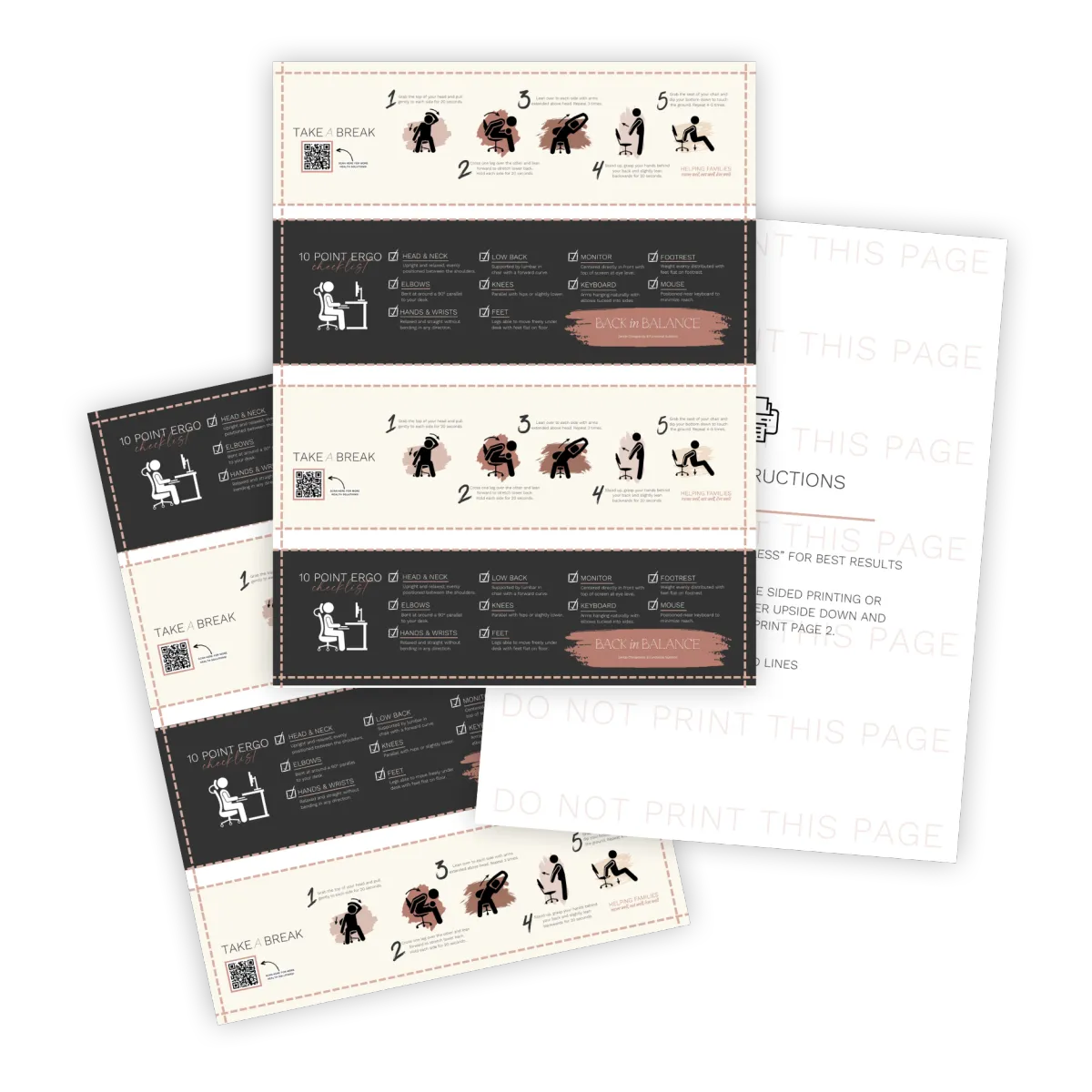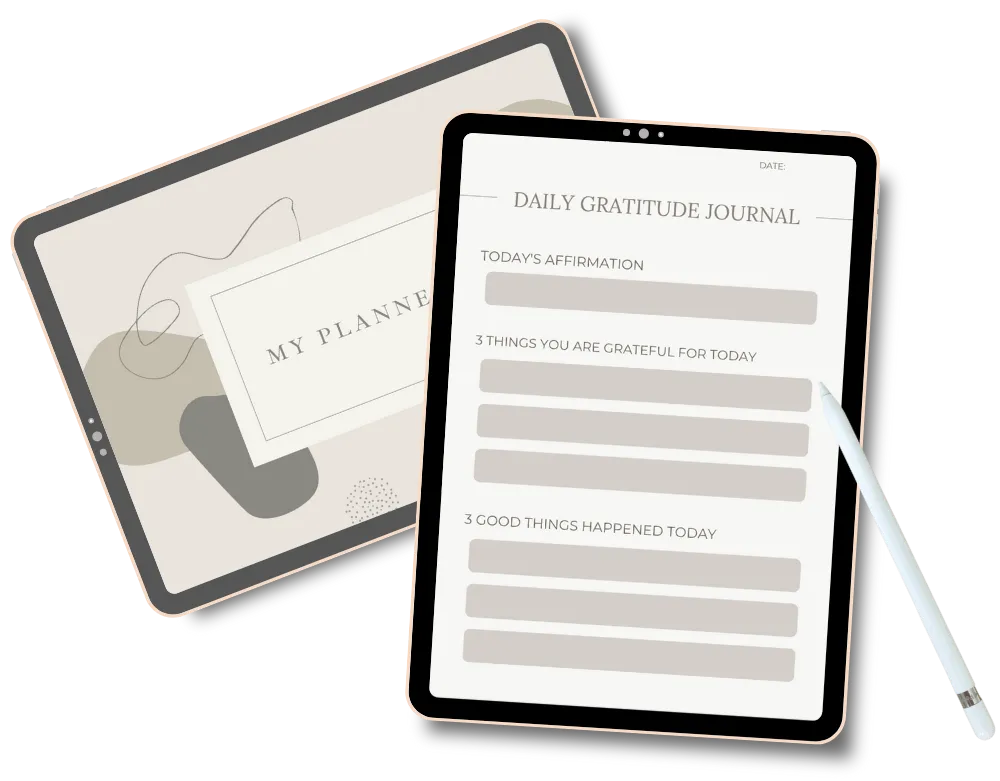

Apple Trackpad

Apple Keyboard


Are you wanting to get pregnant or expecting a little one? Get out free checklist today. This Ultimate Fertility and Pregnancy Checklist gives you everything you need to know for optimized health.

Unlock the secrets to managing stress with our Overcoming Stress Mini Course. Learn how to leverage your nervous system to reduce anxiety and improve well-being. Join today for quick, effective stress relief strategies. Perfect for busy individuals seeking a healthier, stress-free life.

Are you wanting to get pregnant or expecting a little one? Get out free checklist today. This Ultimate Fertility and Pregnancy Checklist gives you everything you need to know for optimized health.

Do you ever feel stiff and sore from sitting all day? If so, download our printable bookmark and walk through the 10 point ergonomic checklist to help you get back in balance from anywhere!





How Your Gut Shapes Your Mood + Energy After 35
Ever Feel Anxious or Drained After You Eat?
If you’ve ever felt anxious, irritable, or like your energy crashes after a meal — it’s not in your head, it’s in your gut. Today, we’re diving into the gut-brain connection, especially after 35, and how your digestion might be shaping your mood, hormones, and resilience.
I’m Dr. Anjali, and this month we’ve been unpacking how functional health drives resilience — from your gut and hormones to nutrition and immune support. To wrap up the month, let’s go deeper into one of the most powerful yet misunderstood systems in your body: the gut-brain connection.
What Your Gut Is Telling Your Brain
We’re learning more each year about how the microbiome — the trillions of bacteria in your gut — doesn’t just affect digestion. It impacts your mood, sleep, and even how your body handles stress. For women over 35, this connection becomes extra important as hormones shift and stress patterns amplify.
Let me give you an example. One of my practice members, we’ll call her Emily, told me that every time she ate, she’d either feel bloated and uncomfortable or crash and feel low for hours. She thought she was just being overly sensitive. But it wasn’t in her head — it was her gut-brain loop. Poor digestion was triggering inflammation, and that inflammation was affecting her mood and energy.
Once we supported her gut with small shifts in food, rhythm, and stress, her mood swings started to level out. That’s how powerful this connection is.
The Science Behind the Gut-Brain Link
Let’s talk about what’s happening beneath the surface.
There’s a nerve called the vagus nerve — it’s like a direct phone line between your gut and your brain. If your gut is inflamed, your brain gets those stress signals loud and clear. In fact, 80% of the communication between your brain and body is actually your body talking to your brain, not the other way around.
Then there’s serotonin — your “feel good” neurotransmitter. Did you know that about 90% of serotonin is made in your gut, not your brain? When your gut is out of balance, serotonin production drops, and so does your mood. This can also affect sleep since serotonin converts to melatonin — the hormone that helps you fall and stay asleep.
And it doesn’t stop there. When your digestion is off, inflammation increases, and the brain interprets that as stress. Even mild food sensitivities can trigger this, especially when you eat the same 10–14 foods on repeat each week (which most of us do).
Why It Matters More After 35
After 35, hormonal changes make this connection even more significant. Estrogen and progesterone shifts can slow digestion and affect gut motility. Add in stress from career, parenting, or TTC, and your gut becomes more reactive.
It’s not that your body is “failing” — it’s that years of habits, restrictive diets, antibiotics, and stress have all impacted your gut resilience. Many women tell me, “Food just feels harder now,” and they’re right. Your gut-brain axis becomes more vulnerable — but also more responsive to change.
Simple Steps to Support Your Gut-Brain Connection
1. Breathe before you eat
Before your next meal, take a few deep breaths. Smell your food, slow down, and give your body permission to shift into a “rest and digest” state.
2. Eat fiber and fermented foods consistently
Think small, daily amounts — like a spoonful of sauerkraut or a glass of kefir. Consistency matters more than perfection.
3. Include protein in every meal
Protein helps stabilize blood sugar and mood. Aim for a serving within 30–60 minutes of waking up.
4. Limit ultra-processed foods
Shop the perimeter of the grocery store where fresh, perishable foods live. Small swaps — like an apple instead of packaged applesauce — go a long way.
5. Keep a food + mood journal
Write down what you eat and how you feel 30–60 minutes later. It’s one of the easiest ways to identify hidden triggers and patterns.
The Takeaway
If your mood, energy, or stress feel harder to manage after 35, don’t just blame hormones — listen to your gut. Your gut-brain connection is one of the most powerful tools you have for regulating your nervous system, energy, and resilience.
Download my Functional Resilience Guide to start mapping your own gut-brain patterns. It includes a simple food-symptom tracker to help you understand what your body’s been trying to tell you all along.
Next month, we’ll shift gears into emotional resilience — just in time for the holidays. We’ll talk boundaries, stress regulation, and family rhythms to keep you steady when life gets extra busy.

How Your Gut Shapes Your Mood + Energy After 35
Ever Feel Anxious or Drained After You Eat?
If you’ve ever felt anxious, irritable, or like your energy crashes after a meal — it’s not in your head, it’s in your gut. Today, we’re diving into the gut-brain connection, especially after 35, and how your digestion might be shaping your mood, hormones, and resilience.
I’m Dr. Anjali, and this month we’ve been unpacking how functional health drives resilience — from your gut and hormones to nutrition and immune support. To wrap up the month, let’s go deeper into one of the most powerful yet misunderstood systems in your body: the gut-brain connection.
What Your Gut Is Telling Your Brain
We’re learning more each year about how the microbiome — the trillions of bacteria in your gut — doesn’t just affect digestion. It impacts your mood, sleep, and even how your body handles stress. For women over 35, this connection becomes extra important as hormones shift and stress patterns amplify.
Let me give you an example. One of my practice members, we’ll call her Emily, told me that every time she ate, she’d either feel bloated and uncomfortable or crash and feel low for hours. She thought she was just being overly sensitive. But it wasn’t in her head — it was her gut-brain loop. Poor digestion was triggering inflammation, and that inflammation was affecting her mood and energy.
Once we supported her gut with small shifts in food, rhythm, and stress, her mood swings started to level out. That’s how powerful this connection is.
The Science Behind the Gut-Brain Link
Let’s talk about what’s happening beneath the surface.
There’s a nerve called the vagus nerve — it’s like a direct phone line between your gut and your brain. If your gut is inflamed, your brain gets those stress signals loud and clear. In fact, 80% of the communication between your brain and body is actually your body talking to your brain, not the other way around.
Then there’s serotonin — your “feel good” neurotransmitter. Did you know that about 90% of serotonin is made in your gut, not your brain? When your gut is out of balance, serotonin production drops, and so does your mood. This can also affect sleep since serotonin converts to melatonin — the hormone that helps you fall and stay asleep.
And it doesn’t stop there. When your digestion is off, inflammation increases, and the brain interprets that as stress. Even mild food sensitivities can trigger this, especially when you eat the same 10–14 foods on repeat each week (which most of us do).
Why It Matters More After 35
After 35, hormonal changes make this connection even more significant. Estrogen and progesterone shifts can slow digestion and affect gut motility. Add in stress from career, parenting, or TTC, and your gut becomes more reactive.
It’s not that your body is “failing” — it’s that years of habits, restrictive diets, antibiotics, and stress have all impacted your gut resilience. Many women tell me, “Food just feels harder now,” and they’re right. Your gut-brain axis becomes more vulnerable — but also more responsive to change.
Simple Steps to Support Your Gut-Brain Connection
1. Breathe before you eat
Before your next meal, take a few deep breaths. Smell your food, slow down, and give your body permission to shift into a “rest and digest” state.
2. Eat fiber and fermented foods consistently
Think small, daily amounts — like a spoonful of sauerkraut or a glass of kefir. Consistency matters more than perfection.
3. Include protein in every meal
Protein helps stabilize blood sugar and mood. Aim for a serving within 30–60 minutes of waking up.
4. Limit ultra-processed foods
Shop the perimeter of the grocery store where fresh, perishable foods live. Small swaps — like an apple instead of packaged applesauce — go a long way.
5. Keep a food + mood journal
Write down what you eat and how you feel 30–60 minutes later. It’s one of the easiest ways to identify hidden triggers and patterns.
The Takeaway
If your mood, energy, or stress feel harder to manage after 35, don’t just blame hormones — listen to your gut. Your gut-brain connection is one of the most powerful tools you have for regulating your nervous system, energy, and resilience.
Download my Functional Resilience Guide to start mapping your own gut-brain patterns. It includes a simple food-symptom tracker to help you understand what your body’s been trying to tell you all along.
Next month, we’ll shift gears into emotional resilience — just in time for the holidays. We’ll talk boundaries, stress regulation, and family rhythms to keep you steady when life gets extra busy.
LOCATION
949 Sherwood Ave. #100
Los Altos, CA 94022
HOURS
Sunday 12pm - 4 pm
Monday 10am - 4pm
Tuesday 1pm - 4pm
Wed-Fri 10am - 4pm
Saturday Closed
CONTACT
© Back In Balance 2026 | FAQs | Terms & Conditions | Privacy Policy | Site Credit
©2026 Back In Balance Health. All Rights Reserved. – WEBSITE By: Danielle Damrell Creative Collective, Inc.

